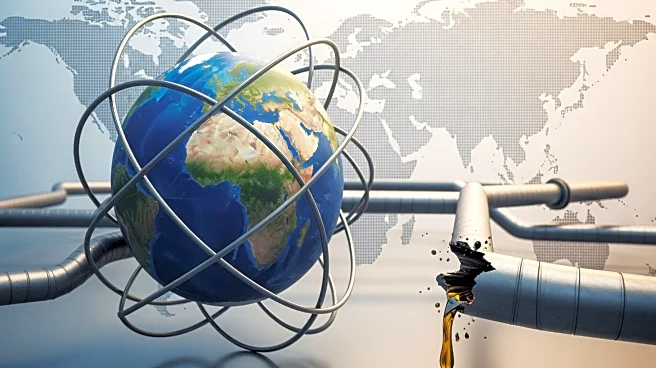What's Happening?
President Trump has announced new sanctions targeting Russia's two largest oil companies, Rosneft and Lukoil, in an effort to pressure Russia to end its military actions in Ukraine. These sanctions, revealed
through Trump's Truth Social platform, aim to cut off significant financial resources that support the Kremlin's military operations. The U.S. Department of the Treasury's Office of Foreign Assets Control (OFAC) has blacklisted these companies, which are responsible for a substantial portion of Russia's oil exports. The move follows similar sanctions imposed by the UK and comes amid stalled peace negotiations between Trump and Russian President Vladimir Putin.
Why It's Important?
The sanctions are significant as they target a critical sector of Russia's economy, potentially affecting its ability to sustain military operations in Ukraine. The oil and gas industry is a major contributor to Russia's federal budget, and these sanctions could strain its economic stability. The impact extends beyond Russia, as global oil prices have already surged by 5% following the announcement. Countries heavily reliant on Russian oil, such as China and India, may face challenges in securing alternative energy sources, potentially leading to higher costs. The sanctions also raise the possibility of secondary sanctions on entities continuing to engage with the targeted Russian companies.
What's Next?
The immediate consequence of the sanctions is a rise in global oil prices, but the long-term effects will depend on the enforcement of secondary sanctions. Countries like China and India may need to reassess their oil import strategies to avoid potential U.S. penalties. The effectiveness of the sanctions in compelling Russia to negotiate peace terms remains uncertain, but they could increase economic pressure on Moscow. The international community will be watching closely to see if these measures lead to a shift in Russia's stance on the Ukraine conflict.
Beyond the Headlines
The sanctions highlight the complex interplay between economic measures and geopolitical strategies. While they aim to weaken Russia's war capabilities, they also risk straining diplomatic relations with countries that continue to trade with Russia. The situation underscores the challenges of using economic tools to achieve political objectives, particularly in a globalized economy where energy markets are interconnected.










